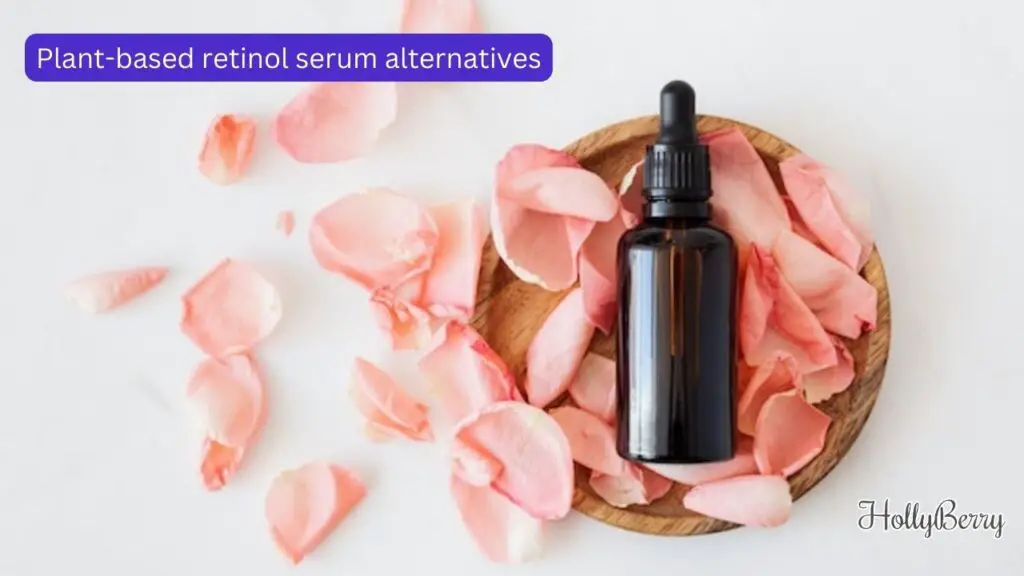
Retinol is a popular ingredient found in most anti-ageing skincare products. This vitamin A derivative has been proven to improve the appearance of fine lines, wrinkles, and other signs of ageing.
However, traditional retinol serums are not always vegan-friendly, as they often contain animal-derived ingredients.
Fortunately, plant-based retinol serum alternatives are now available, offering a cruelty-free and sustainable way to achieve youthful skin.
In this article, we’ll explore the benefits of plant-based retinol serum alternatives, discuss some of the best options available, and answer some frequently asked questions.
Why choose plant-based retinol serum alternatives?
Plant-based retinol serum alternatives offer several benefits that traditional retinol serums cannot match. Here are some of the key advantages of using plant-based alternatives:
Cruelty-free
Traditional retinol serums may contain animal-derived ingredients such as collagen, elastin, and glycerin. These ingredients are often obtained from animal carcasses or byproducts of the meat industry.
In contrast, plant-based retinol serum alternatives use natural ingredients sourced from plants, making them a more ethical choice for conscious consumers.
Sustainable
Plant-based ingredients are generally more sustainable than animal-derived ingredients. They require less water, land, and resources to produce, making them a more eco-friendly option.
Non-toxic
Traditional retinol serums may contain harmful chemicals such as parabens, sulfates, and phthalates. Plant-based alternatives, on the other hand, use natural ingredients that are gentle on the skin and free from toxic chemicals.
Suitable for sensitive skin
Some people with sensitive skin may experience irritation or redness when using traditional retinol serums. Plant-based alternatives are generally gentler on the skin and less likely to cause adverse reactions.
Best plant-based retinol serum alternatives
Bakuchiol: This natural ingredient is derived from the seeds of the babchi plant and has been shown to have retinol-like effects on the skin.
Bakuchiol can help reduce the appearance of fine lines and wrinkles, improve skin elasticity, and enhance skin texture and tone.
Rosehip oil
Rich in antioxidants, essential fatty acids, and vitamins, rosehip oil can help improve the appearance of fine lines, wrinkles, and dark spots. It also helps hydrate and nourish the skin, leaving it looking healthy and radiant.
Carrot seed oil
This essential oil is packed with antioxidants and vitamin A, making it an excellent alternative to traditional retinol serums. C
arrot seed oil can help reduce the appearance of fine lines and wrinkles, improve skin texture, and boost collagen production.
Sea buckthorn oil
This natural oil is rich in antioxidants, essential fatty acids, and vitamins, making it an excellent anti-ageing ingredient. Sea buckthorn oil can help reduce the appearance of fine lines and wrinkles, improve skin elasticity, and promote a youthful glow.
DIY plant-based retinol alternative that you can easily make at home

Ingredients
- 1 tablespoon of rosehip oil
- 1 teaspoon of carrot seed oil
- 2-3 drops of frankincense essential oil
- 1-2 drops of lavender essential oil
- 1-2 drops of geranium essential oil
Instructions
- In a small glass bottle, mix together the rosehip oil and carrot seed oil.
- Add the frankincense, lavender, and geranium essential oils to the mixture and stir well.
- Store the mixture in a cool, dark place and use it as needed.
Rosehip oil is a natural source of vitamin A, while carrot seed oil contains high levels of beta-carotene, which can be converted into vitamin A by the body.
Frankincense essential oil has been shown to improve skin elasticity, while lavender and geranium essential oils have soothing and calming properties that can help reduce inflammation and redness.
To use the DIY plant-based retinol alternative, apply a small amount to clean, dry skin and massage gently in a circular motion.
You can use it in the evening after cleansing and toning your skin. Be sure to patch-test the mixture on a small area of skin before applying it all over your face and neck to avoid any potential allergic reactions or irritation.
It’s important to note that while this DIY plant-based retinol alternative can provide some anti-ageing benefits, it may not be as potent as traditional retinol serums. It’s also important to use this mixture consistently over a period of time to see results.
Additionally, it’s important to choose high-quality, organic ingredients when making your own skincare products. Always do a patch test before applying any new product to your skin, especially if you have sensitive skin.
FAQs For plant-based retinol serum

Q: Are plant-based retinol serum alternatives as effective as traditional retinol serums?
A: Yes, many plant-based retinol serum alternatives have been shown to have similar effects on the skin as traditional retinol serums. Bakuchiol, for example, has been proven to have retinol-like effects on the skin without the same level of irritation or sensitivity.
Q: Can I use plant-based retinol serum alternatives if I have sensitive skin?
A: Yes, plant-based retinol serum alternatives are generally gentler on the skin and less likely to cause adverse reactions. However, it’s still important to patch-test new products and consult with a dermatologist if you have any concerns.
Q: Can plant-based retinol serum alternatives replace traditional retinol serums completely?
A: While plant-based retinol serum alternatives can be an excellent substitute for traditional retinol serums, they may not provide the same level of potency or effectiveness. It’s important to choose a plant-based retinol serum alternative that suits your skin type and concerns, and use it consistently for best results.
My conclusion
Plant-based retinol serum alternatives offer a sustainable, cruelty-free, and non-toxic way to achieve youthful, radiant skin without harming animals or the environment.
From bakuchiol to rosehip oil, there are many natural ingredients to choose from that can provide retinol-like benefits without the potential drawbacks.
By incorporating plant-based retinol serum alternatives into your skincare routine, you can support ethical and eco-friendly practices while achieving your anti-ageing goals.


